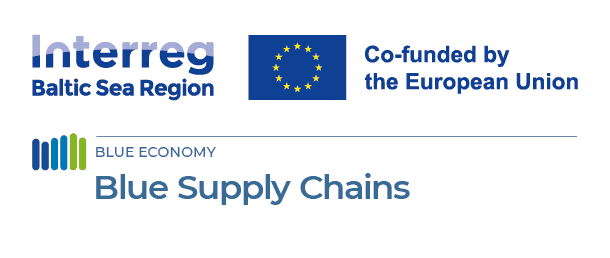
BSC Partners at the EUSBSR workshop on green shipping corridors in Berlin
03 July 2023
Several partners involved in the Blue Supply Chains (BSC) project recently took part in the “Operational steps to establish green shipping corridors as a way to achieve zero-carbon shipping” workshop in Berlin. The workshop emphasized the importance of collaboration, open dialogue and innovative technologies.
The event, organized by the EU Strategy for the Baltic Sea Region (EUSBSR) Policy Area (PA) Ship and hosted by the German Federal Ministry of Transport and Digital Infrastructure of Germany, gathered ca. 40 participants representing shipping line companies, ferry operators, shipbuilding industry representatives, port authorities and operators, academic institutes, authorities and policymakers, and NGOs from different countries across the Baltic Sea, Nordics and other parts of Europe.
BSC’s Stefan Breitenbach (Port of Hamburg), Andrius Sutnikas (Klaipeda Science and Technology Park) and Jan Jarmakowski (Gdynia Container Terminal), along with Sofie Fogstad Vold (Norwegian Ministry of Climate and Environment) and Magnus Gustafsson (Åbo Akademi University), took part in a discussion panel focused on ideas related to the improvement of collaboration between governments, private sector companies, and other stakeholders, with a particular emphasis on the inclusion of cargo owners in the discussion and planning processes. It is vital to enable active involvement from the side of the latter when planning to establish green corridors, as they would bear some of the costs associated with the process.
During the panel discussion, participants also raised concerns about the price gap of alternative fuels and the importance of filling that gap. They also highlighted the need for technological advancements related to LNG, ammonia, and batteries, and the importance of innovative new technology solutions. It was emphasized that the success of establishing green shipping corridors requires engagement not only from ship owners and port operators but also from the energy sector and other relevant industries.
These findings were perfectly in line with the main pillars of the BSC project, i.e., strategies for providing, handling and storing alternative fuel, promotion of more environmentally friendly transport chains in the hinterland, with a focus on intermodal transport, and, to a degree, support for further electrification of handling equipment.
Key focus points of the workshop included:
- Collaborative Approach: Collaboration between stakeholders, including governments, private sector companies, and different industry sectors, is crucial for successfully establishing green shipping corridors.
- Financial Risk-Sharing: Sharing the financial risks associated with the establishment of green corridors among stakeholders is essential to ensure their viability and sustainability.
- Incentives and Support: Incentives, such as supportive policies, funding opportunities, and regulatory frameworks, are necessary to accelerate the transition to zero-carbon shipping and encourage industry participation.
- Technological Advancements: Embracing innovative technologies and addressing challenges related to alternative fuels, bunkering infrastructure, and safety requirements are critical for the successful implementation of green shipping corridors.
- Global Collaboration: International coordination and knowledge-sharing among different countries and regions are important to create a unified approach and ensure harmonized implementation of green shipping corridors worldwide.
The event was organized as back-to-back with the meeting of Germany’s Presidency of the Council of Baltic Sea States (CBSS) Expert Group on Sustainable Maritime Economy.
You can read a full summary of the workshop here.





